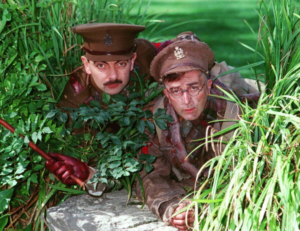To cheers, comedian Leslie Crowther strides into a studio and peers down at a gold-coloured card. “Wendy Partridge, come on down!” The camera cuts to a 300-strong audience that’s rowdier than normal for mid-Eighties ITV on a Saturday evening. Thrusting her arms in the air, a jubilant woman in her 30s leaps from her seat and squeezes awkwardly past five pairs of legs to her left. For the next hour, she and eight other contestants try to guess the retail prices of, among other items, an exercise bike, an ice-cream maker, a music centre and a terrarium. By modern standards it’s a rather sweet affair, if somewhat frenetic. Yet The Price is Right’s debut 40 years ago was a watershed event in UK television.
The Establishment loathed it on sight. To broadsheet and tabloid journalists alike, the importation of the long-running US format — refined by game show kingpin Mark Goodson in 1972 from a show he’d first produced from 1956 — was nothing less than a deplorable new low in British culture. “Unashamedly designed to bring out the avaricious worst in both contestants and audiences” was the Daily Telegraph’s damning verdict. Over at The Guardian, critic Hugh Hebert called it “the noisiest, most mob-hysterical, money-grubbing game show to be slavishly copied from America so far”.
Evidently viewers were less judgmental. By the end of its initial three-week run, cut short by an electricians’ strike at Central Television in Nottingham, The Price is Right was a sensation, scoring ratings of 16 million. Under second-term Tory prime minister Margaret Thatcher, the masses weren’t just buying their council houses and voting for privatisation, a policy that would sell them bargain-price British Telecom shares in late 1984. They were drooling over consumer durables, to the disgust of their supposed social betters. This was a new Britain, which coveted such items — and knew how much they were worth.
One can, if one wishes, detect both oikophobia and anti-American snobbery in the horror that greeted The Price is Right. Watching that debut show today on YouTube, it’s clear that the working-class coach parties in the audience have left their British reserve on the bus, relishing the possibility of short-lived fame and a nice little windfall. When contestants look uncertain, the 291 onlookers yell good-natured advice in the manner of Shakespearean theatregoers or Victorian music hall patrons. It’s worth remembering as well that, in the Eighties, American traits such as appreciating money and showing enthusiasm were frowned upon by the more supercilious Britons among us. The stupid, vulgar, materialistic Yank was the stereotype du jour, not least because a former Hollywood B-lister, Ronald Reagan, was heading a Right-wing resurgence in tandem with the much-vilified Thatcher.
The staunchest defender of ITV’s newest hit was its producer, William G. Stewart, a former Butlins redcoat who’d cut his teeth in the BBC’s light entertainment department. Before his TV career, he’d been a private secretary to the Labour MP Tom Driberg in the early Sixties. “English people can be just as lively as anyone else,” Stewart assured a reporter in the days leading up to 24 March. “Look at the way people behave at football matches and boxing matches.” The snootier criticisms seemed to grate on Leslie Crowther, however, who accused the show’s detractors of trying “to read all manner of sociological data into something intended to be nothing more than fun. And no, we don’t feed the audience gin crisps to get them into the right psyched-up frame of mind — they work the spell on themselves as they travel here.”
Crowther, who’d present the show until 1988, was in a happy position. Before then, he’d been best known as the presenter of Crackerjack, the BBC’s variety show for children, and as the face of Stork SB margarine commercials. Now, all of a sudden, he was raking in the cash as a rictus-grinned, flamboyant showman in his early 50s. But it’s the lively, garrulous contestants who are the stars of that first show — notably Norma, who wears comically large, distorting Coke-bottle glasses and can barely contain her excitement when she wins a tumble dryer. To Hebert in The Guardian, she resembled “a pogo stick with spectacles”.
Norma eventually triumphs in the showcase final, winning two nights at London’s Ritz Hotel, tickets to a West End show, a luggage set, a 35mm camera and a slide projector. She narrowly misses out on a trip to New York and back on the QE2 cruise liner and Concorde, but in the landscape of Winner Takes All and Sale of the Century, her haul is staggering. As a rule, the average weekly winnings on ITV shows like these were capped at £1,750 — that’s why Bullseye’s speedboat was offset by pen sets and teddy bears. When The Price is Right returned in May for six more shows, watchdog the Independent Broadcasting Authority warned it be less generous, or else.
On the strength of the first series, 25,000 people applied for studio tickets to the second, which ran to 25 shows. “The fact is that the audiences are willing the contestants to win,” Crowther stressed. “That’s not greed, that’s generosity.” In the autumn, the ongoing culture clash reached the Edinburgh Television Festival, where BBC variety chief James Moir accused ITV in a formal debate of consciously lowering standards. “The game show represents the pursuit of ratings, not the pursuit of excellence,” he declared, adding pointedly that ITV had made 300 shows like these in a year.
John Birt, a current affairs man who’d risen to the role of London Weekend Television’s director of programmes, begged to differ. Alarming his intellectual peers, the future director-general of the BBC took the side of the ex-redcoat. Yes, The Price is Right had topped the ratings, he said. Crucially, though, it had also scored highly in the viewer appreciation index. The core of the BBC’s appeal was to a “suburban middle-class England that uses words like ‘standards’”, Birt argued. By contrast, the great strength of Stewart’s show was that it attracted a neglected constituency — the older, working-class audience.
But, from the Eighties onwards, that was the constituency that picked the winner in Britain. They voted for Thatcher’s Conservative Party, which ultimately won two landslide election victories in the Eighties by appealing to Britons’ aspirational needs. As highbrow commentators looked on aghast, ordinary people didn’t especially seem to mind if their “barrow-boy” sons became City traders, or if getting rich quick was not just socially acceptable but desirable. Boastful plasterer “Loadsamoney”, a satirical creation of the privately educated comic Harry Enfield, became a beloved icon of the decade. And as pop stars and “alternative” comedians complained that by reversing nationalisation, the Tories were “selling you things you already own”, the advertising slogan “Tell Sid” heralded a headlong rush for newly listed British Gas shares.
An ancient culture of deference genuinely seemed to be dying. And with it was fading the bourgeois cultural gatekeeping of a British media still governed by the principles of Lord Reith. Beyond terrestrial gameshow fun, this period saw the explosion of home video and the massive popularity of American director Sam Raimi’s The Evil Dead. The “video nasties” panic, in which commentators reached for their fainting couches on hearing that the hoi polloi and their children might be watching gory horror films, culminated in the Video Recordings Act 1984, which insisted that videos be rated in the same way as cinema films. This being the UK, class assumptions were lurking just under the surface.
As the year drew to a close, the BBC passive-aggressively responded to ITV’s The Price is Right with a laconically amused documentary, written and presented by film critic Barry Norman, about over-the-top game shows in California (predictably, its title was Come On Down!). Norman’s hour-long treatise is a thoughtful addition to the “aren’t Americans weird?” genre, a staple of British television for decades. Norman concludes that shows like these are harmless, but worries aloud that they reflect a markedly American brand of cynicism — “that true happiness is only possible though the acquisition of more and more material possessions”. This might be good for bodily comfort, he suggests, “but I really don’t think it does much for the soul”.
Calmly and eloquently, Norman had alluded to the real problem with The Price is Right. It wasn’t that the show was poorly made. It wasn’t that audiences in Nottingham were idiots or somehow unworthy. It was that without a sense of restraint, of social responsibility, TV executives would keep pushing at the boundaries of good taste indefinitely. And push they would. Crowther’s campy game show was enriching as far as it went, but it didn’t upend contestants’ lives. William G Stewart said as much in 1984, when he remarked that giving away, say, £1 million “would end up doing more harm than good”. When the Independent Television Commission abolished prize limits in 1993, the writing was on the wall. Four years after that, Who Wants to Be a Millionaire? became a homegrown, worldwide smash hit.
Since then, what began as a force for social levelling has become a race to the bottom. Having uncorked Britain’s new-found materialism, producers moved on to coarser passions. Channel 5’s one-off Naked Jungle, presented by a desperate (and naked) Keith Chegwin in 2000, along with the arrival of Big Brother, launched a reality TV genre that wallows among the atavisms of sex and conflict. Watching from the sidelines, commentators continue to sneer at “low-information voters” and “gammons”. But while rewatching The Price is Right evokes a sense of genuine liberation, of a class of people free to aspire to a different sort of lifestyle for the first time, our current landscape is flatter, and staler. Instead of sneering at such television, the new Establishment are the ones crafting and purveying it, serving up not thrills and escapism, but a form of reality TV which can addict but never satisfy. In culture as in politics, the line between democracy and demagogy is always unstable.
Disclaimer
Some of the posts we share are controversial and we do not necessarily agree with them in the whole extend. Sometimes we agree with the content or part of it but we do not agree with the narration or language. Nevertheless we find them somehow interesting, valuable and/or informative or we share them, because we strongly believe in freedom of speech, free press and journalism. We strongly encourage you to have a critical approach to all the content, do your own research and analysis to build your own opinion.
We would be glad to have your feedback.
Source: UnHerd Read the original article here: https://unherd.com/




